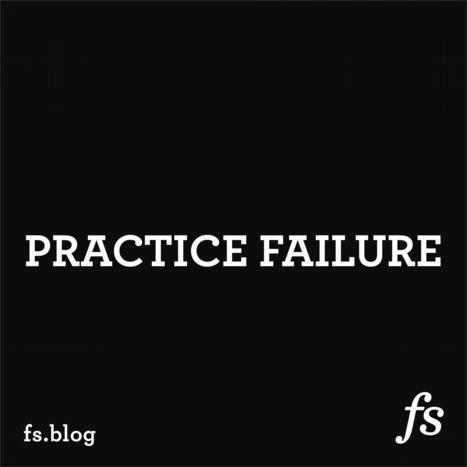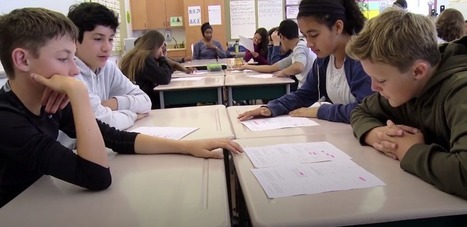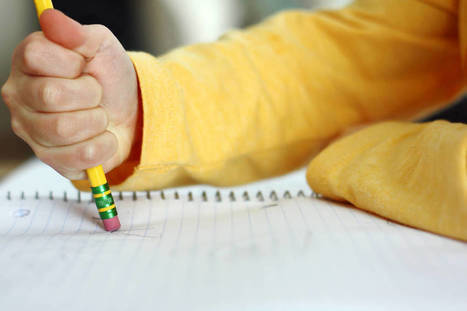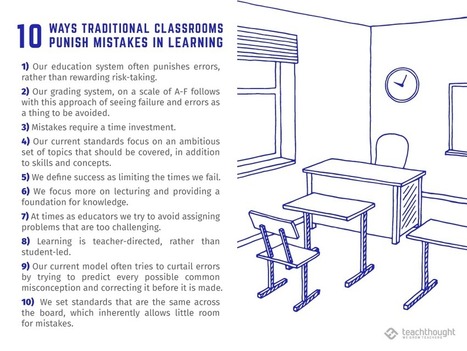 Your new post is loading...
 Your new post is loading...

|
Scooped by
John Evans
|
We learn valuable lessons when we experience failure and setbacks. Most of us wait for those failures to happen to us, however, instead of seeking them out. But deliberately making mistakes can give us the knowledge we need to more easily overcome obstacles in the future.
Teachers know that students learn a tremendous amount from scrutinizing their mistakes, but getting them to take the time to stop and reflect is a challenge. Some teachers have stopped giving grades altogether to try to refocus class on learning instead of on grades. For others, that's too extreme. Leah Alcala, a seventh- and eighth-grade math teacher at King Middle School in Berkeley, California, developed a grading strategy that falls somewhere in the middle.
"What I was finding when I was handing back tests the old way, where I put a grade on it, was kids would look at their grade, decide whether they were good at math or not, and put the test away and never look at it again," Alcala says in a Teaching Channel video featuring her strategy.
Now when she returns tests, Alcala highlights mistakes and hands the tests back to students without a grade. She doesn't tell them what they did wrong; they have to figure that out.
"By not putting a grade on the test, I feel like what I'm allowing them to do is wrestle with the math they produced for me first and think of the grade second," Alcala said.

|
Scooped by
John Evans
|
Today, if you asked me about my most memorable learning failures, I will tell you I am glad they happened.
My errors have made me a better teacher and learner. I can now relate to students who have a difficult time understanding a concept. The failures themselves may not have been my strongest point, but what I learned from them was invaluable. Mistakes can be excellent learning opportunities.

|
Scooped by
John Evans
|
Despite its popularity, memorizing information is one of the least effective learning strategies. While it may seem efficient, students are more likely to forget memorized material if they don’t reinforce their learning with other strategies, and a new study looks at how incorporating guesswork into a lesson can significantly boost students’ ability to recall information.
Most of us can remember a moment like this from our school years: the teacher poses a question – maybe it’s math, maybe history. You raise your hand, you give your answer with full assurance. And then? You’re shot down. You got it wrong.
We remember moments like this because they brim with some of our least favorite emotions: shame, humiliation, self-recrimination, and that gutting sense that you want to melt into the floor. Ah yes, I remember it well.
As it turns out, though, such moments are ripe with learning opportunity. Contrary to what many of us might guess, making a mistake with high confidence and then being corrected is one of the most powerful ways to absorb something and retain it.
|

|
Scooped by
John Evans
|
Teachers know that students learn a tremendous amount from scrutinizing their mistakes, but getting them to take the time to stop and reflect is a challenge. Some teachers have stopped giving grades altogether to try to refocus class on learning instead of on grades. For others, that's too extreme. Leah Alcala, a seventh- and eighth-grade math teacher at King Middle School in Berkeley, California, developed a grading strategy that falls somewhere in the middle.
"What I was finding when I was handing back tests the old way, where I put a grade on it, was kids would look at their grade, decide whether they were good at math or not, and put the test away and never look at it again," Alcala says in a Teaching Channel video featuring her strategy.
Now when she returns tests, Alcala highlights mistakes and hands the tests back to students without a grade. She doesn't tell them what they did wrong; they have to figure that out.
"By not putting a grade on the test, I feel like what I'm allowing them to do is wrestle with the math they produced for me first and think of the grade second," Alcala said.

|
Scooped by
John Evans
|
The greatest mistake I ever made in my education was failing a physics course at Cornell.
I opted to take an auto-tutorial class that did not require calculus because I was afraid to make math errors. Up until this point, I had never failed at anything. It was a turning point for me. I had to dispel prior notions of learning to succeed. I accepted that there would be many errors along the way. I relearned the basics I had previously memorized through difficult examples and repeated detailed lab work.
On a broader scale, changing the way we see errors–as natural by-products of the learning process rather than time-costing falters to be avoided–can help us produce better learning outcomes in education.

|
Scooped by
John Evans
|
One of the biggest mistakes we make is that we assume we always learn from our mistakes. I’ve met enough people who learned little from their own stupidity.
We all know these people. In fact, we probably are these people. You know why? It’s damned hard to learn from your mistakes. I’ve never met someone who actually enjoyed failing.
Let’s be honest, no one likes to make mistakes, and lose their time, energy, or money. So that’s why we need to make an effort to learn from the things that we wish we didn’t do. The father of functional philosophy and pragmatist philosophy, John Dewey, made that point obvious:
“The person who really thinks learns quite as much from his failures as from his successes.”
Learning from your mistakes does not happen automatically — it requires thinking and reflection. So here’s my reflection on the lessons I learned from the mistakes I made in my twenties. Here we go.

|
Scooped by
John Evans
|
Most of us can remember a moment like this from our school years: the teacher poses a question – maybe it’s math, maybe history. You raise your hand, you give your answer with full assurance. And then? You’re shot down. You got it wrong.
We remember moments like this because they brim with some of our least favorite emotions: shame, humiliation, self-recrimination, and that gutting sense that you want to melt into the floor. Ah yes, I remember it well.
As it turns out, though, such moments are ripe with learning opportunity. Contrary to what many of us might guess, making a mistake with high confidence and then being corrected is one of the most powerful ways to absorb something and retain it.
|
 Your new post is loading...
Your new post is loading...
 Your new post is loading...
Your new post is loading...
















